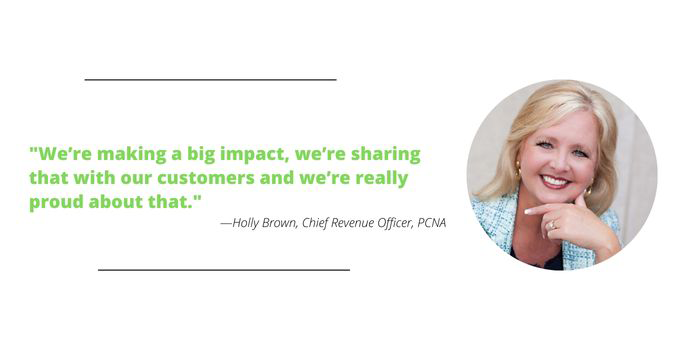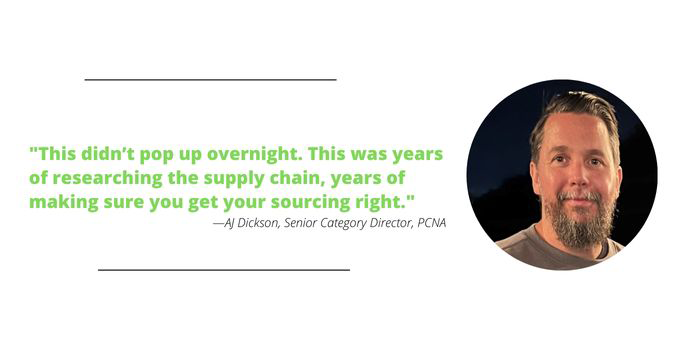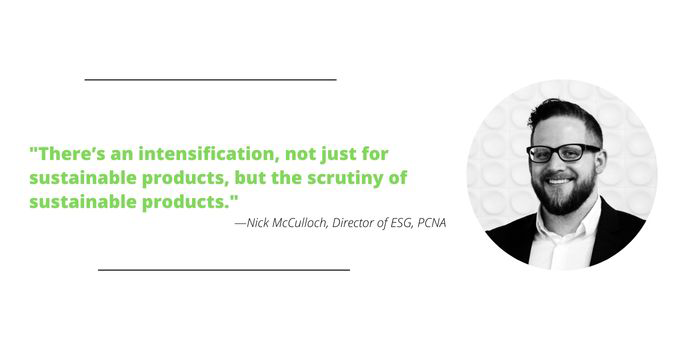PCNA’s ProudPath At One: A Year Of Growth And Sustainability Milestones

In April 2022, Polyconcept North America (PPAI 113079, S15) launched ProudPath, an online platform that helps distributors meet their clients’ environmental, social and governance (ESG) and product responsibility objectives. One year later, the supplier is assessing the program’s growth and sharing what’s next.
The Program
The ProudPath program’s approach to meeting customers’ corporate social responsibility objectives is broken out into five pillars:
- Purpose Partners
- Brands That Give Back
- Responsible Sourcing
- Owner Diversity
- Eco-Friendly And Sustainable Products
“From the customer perspective, it is all resonating,” says Holly Brown, PCNA’s chief revenue officer. “There’s definitely a focus on the give-back element of the platform and what are we involved with. But the supply chain transparency, the diversification of our sourcing efforts, coupled with our initiatives around minority-owned businesses and the social aspects, are equally as important.
“On the green side of things, it’s about making sure our products truly are sustainable and debunking the greenwashing myth and practices that may have plagued our industry years ago. That’s not what ProudPath is about, and we feel really good about taking it in that direction.”

AJ Dickson, senior category director at PCNA, says, “What we’ve found over the past year is that everyone is on a spectrum, from our customers are only just starting to ask about this, to people who are well advanced in that they have end users that want to tie their corporate giving into their own ESG initiatives and their own give-backs. They want to make sure that every aspect of their business aligns with those values and those initiatives.”
The ProudPath program’s pillars as supported by products and education. ProudPath now features hundreds of products – ranging from eco-friendly and sustainable drinkware, tech and bags to apparel – and more than 30 retail brands, including Camelbak, tentree, Herschel, Chico Bag, Nimble and Hydro Flask.
- ProudPath orders are shipped using UPS’s carbon neutral service, an option that supports projects to offset transportation emissions.
- PCNA’s Pittsburgh, Miami and Charlotte facilities have earned Forest Stewardship Council Chain-of-Custody certification, ensuing that FSC-certified products are from responsibly managed forests.
- In February 2023, PCNA brought on Nick McCulloch, the company’s first director of ESG.
McCulloch’s role is a new one at PCNA. It builds on the company’s accomplishments and shepherds them further.
“My job is really to evaluate and coordinate sustainability efforts,” McCulloch says. “That includes product development, but also what we’re doing in people management on the HR side of things, upstream, and also how we’re managing things downstream with recycling or takeback products, or our direct operations and sustainability at our facilities.
“I see myself as a coordinator of many proceeding efforts, and also new projects, things like our sustainability report that will be forthcoming later this summer, that I will be responsible for. Coordinator or strategizer of our ESG direction is how I would view my role.”
Accomplishments
One year in, PCNA’s ProudPath program has achieved several milestones. And some of the company’s sustainability accomplishments pre-date ProudPath – its partnership with 1% For The Planet, which began in 2019 and entails PCNA donating 1% of its eco-friendly product sales to environmental nonprofits, has generated more than $1 million in donations to date.
During the past year, PCNA has also announced new partnerships with nonprofits. These include veritree, a program that connects businesses with reforestation projects to help regenerate the world’s forests and create jobs for planters; the Surfrider Foundation, which works to protect the world's oceans, waves and beaches; and The Giving Grove, an organization supporting community efforts to create neighborhood gardens and orchards to fight food insecurity.

“We are partnered with several philanthropic organizations, and we have expanded our partnerships,” Brown says. “And we’re making sure that we choose partners where we can see where the donations are going and we can see the positive impact that we’re trying to achieve.
“We’re making a big impact, we’re sharing that with our customers and we’re really proud about that.”
Some of the ProudPath program’s milestones include:
- 20 million plastic bottles have been upcycled. This refers to melting down of plastic and turning it into new products of increased value such as bags, journals and umbrellas.
- 1.5 million pounds of cotton have been recycled, including fabric cast-offs from the apparel making process.
- 6 million trees have been planted through PCNA’s partnership with tentree, plus the partnership with 1% For The Planet
“A lot of times, customers don’t know where to start,” Dickson says. “It’s overwhelming. This is a rapidly evolving space, compliance regulations are rapidly changing, and what we consider sustainable is rapidly changing. Every customer is somewhere different on that journey, on that spectrum, whether it is an existing customer that is beginning to change or they get a new client who maybe has different requirements than what they may be used to. They want to go somewhere that is reliable and that they can trust, and that’s the biggest change that I’ve seen over the last year.”
What’s Next
Looking ahead, PCNA notes that environmental and social responsibility will remain a key component in every part of the business. Every aspect of the product lifecycle is up for evaluation – ranging from the way it is designed and manufactured, its usefulness and quality and what happens to it once it has reached the end of its usable life.
“We recently received Ecovadis silver validation, which is a stamp for supply chain vetting from a sustainability standpoint, which is something we’re proud of but also something we intend to continue to improve upon,” says McCullough. “There’s an intensification, not just for sustainable products, but the scrutiny of sustainable products. We want our products to have the impact we say they have. Partnering with third-party certifications or some other verifying or certifying body, making sure the claims we make are backed up on a reasonable basis, is something we are really committed to doing.”
The distributors the company works with are also making the most of ProudPath.
“A lot of our distributors are getting very savvy about thinking through their clients ESG strategies,” Brown says. “They do their research ahead of time, particularly for big program opportunities; they understand what that enterprise’s goals are, and they work with us to select the right type of product and categories that support them and using the ProudPath umbrella to support them. We’ve seen some meaningful wins across the board.”

PCNA is also developing a new corporate social responsibility report and growing the education it offers distributors through the ProudPath program:
- New web tools featuring specific eco/sustainable-related search functions.
- New eCatalog highlighting brands, products and PCNA’s impact.
- New ProudPath ProTips video series.
- New eco/sustainable glossary of terms.
When PCNA launched ProudPath in 2022, CEO Neil Ringel said that he hoped the program didn’t stay unique for long and that the larger promotional products industry joined the company on this journey.
“Sustainability used to be considered a trend,” Brown says. “We don’t consider it a trend at all. We consider it to be a movement. We launched ProudPath with the intention of it being a turnkey platform for our distributor partners to use, but also a call to the industry from a thought leadership perspective. We think it’s time that this becomes a movement that goes well beyond the product itself and look at the entire product lifecycle, from the way a product is designed and manufactured all the way to ensuring the quality of the product and ultimately what happens when it reaches the end of its life.
“We don’t feel that our responsibility ends at the time of the sale. We need to ensure that we’re thinking products all the way through the lifecycle and that we’re educating our distributors on that.
Dickson adds, “This didn’t pop up overnight. This was years of researching the supply chain, years of making sure you get your sourcing right and I think that’s the big shift. Customers want the transparency and they want to make sure they’re comfortable with where the product is coming from. This isn’t a trend, this is a generational shift. We have to recognize that. The workforce has gotten younger and their values have changed and their buying habits have changed. We have to make sure we adapt to that.
“I think it will get to the point that it’s just expected that you have eliminated as much of the virgin plastic out of the supply chain as possible, that you’re transparent as to where it’s coming from. Those are going to be the bare minimum expectations. Then the question becomes, what’s next? How do we clean up the supply chain, how do we source closer to home, how can we do all these other things and continue to evolve and improve on it, because customers are certainly going to expect that from us in the future.”

